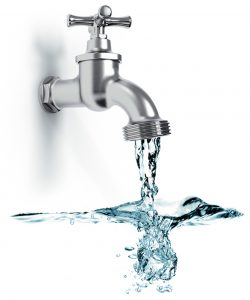Water Treatment
 Water is abundant with minerals and organic compounds that have the ability to elevate an ordinary beer recipe to the status of a world classic, or drown it in the shallows of mediocrity. Luckily for brewers, water is also a flexible substance that can be made to order to brew beers of any style — provided it is treated right.
Water is abundant with minerals and organic compounds that have the ability to elevate an ordinary beer recipe to the status of a world classic, or drown it in the shallows of mediocrity. Luckily for brewers, water is also a flexible substance that can be made to order to brew beers of any style — provided it is treated right.
Tap water (which the home brewer is generally restricted to) needs to be treated, before it is heated for mashing or sparging. Tap water requires the addition of certain chemicals to remove any trace of chlorine, and to obtain the correct levels of alkalinity and calcium content.
Removal of Chlorine and Chloramine
These are undesirable compounds found in some tap water supplies, which react with phenols from the malt and hops to create an unpleasant ‘medicinal’ flavour which will ruin your brew even in tiny concentrations, and no amount of ageing will remove it. If you use bottled water, this step can be skipped because it doesn’t contain chlorine or chloramine.
The easiest and quickest method to remove any traces of chlorine and chloramine is simply to use Campden tablets. It is sufficient to add a quarter of a Campden tablet (crushed) to both the mash water and sparge water.
Alkalinity level
This is the main reason for treating water. The purpose is to make sure the mash pH falls within the desired range of 5.2 – 5.6, which has a number of benefits, such as improved enzyme activity, more efficient conversion, better hop extraction in the boil, better protein precipitation, improved yeast health and clarity of the finished product to name but a few. Alkalinity is measured in terms of the ppm (parts per million) concentration of Calcium Carbonate (CaCO3). There is no direct relationship between the alkalinity of the water used for mashing and the pH of the mash – alkalinity is “a measure of the water’s ability to resist pH changes”.
A testing kit such as the Salifert KH/Alk kit is used to measure the alkalinity of your tap water. When you know what the alkalinity is, you need to adjust it to roughly the correct level. To achieve the correct pH value, it has been found that (a) sparge water should always be adjusted to about 30 ppm or less, and (b) mash water should be adjusted to:
For a pale beer – 20 ppm
For an amber beer – 35 ppm
For a brown beer – 75 ppm
For a black beer – 120 ppm
I use Carbonate Reducing Solution (CRS) (also known as AMS) to reduce alkalinity (ie. to reduce the pH). Adding CRS at a rate of 0.5ml per litre of water will remove around 95 ppm of alkalinity.
To increase the alkalinity to the correct level (ie. to increase the pH), use sodium bicarbonate (ie. baking soda). Adding sodium bicarbonate at a rate of 0.1 gm per litre of water increases the alkalinity by about 60 ppm.
It should be noted that CRS and sodium bicarbonate will not lower or raise the pH of water; they alter the pH of the wort due to reactions with malt components.
Rather than adjusting the alkalinity in the water before mashing, some home brewing resources suggest testing the pH level once the mash has started, and adjust by adding CRS or sodium bicarbonate to the mash. Personally, I like to make the adjustment as detailed above, as well as testing the pH of the mash. The advantage of adjusting the alkalinity up front is that you are ensuring that the mash pH will start in the acceptable range (5.2 to 5.6).
It is important to check the alkalinity of your water, and/or to check the pH of the mash for each brew – I’ve found that my tap water alkalinity varies throughout the year between 20ppm and 100ppm.
Calcium content
Calcium is an important ion in brewing; it is beneficial for enzyme activity during the mash and is essential for healthy yeast, good fermentation and clarification. The minimum level of calcium in brewing water is debated somewhat; 50 ppm should be considered a bare minimum, however some sources suggest 100 or even 150 ppm as a minimum. The malt does supply some calcium so a recommended target is 100 ppm.
A testing kit such as the Salifert Ca kit is used to measure the Calcium content of your tap water. When you know what the Calcium concentration is, you need to adjust it to roughly the correct level.
To increase the Calcium concentration of the mash and sparge liquor, it is recommended to use gypsum for hoppy beers like IPAs and pale ales and to use calcium chloride for malty beers like brown ales and Scotch ales. If brewing a more balanced beer like an English bitter, use a combination of the two.
Adding Gypsum at a rate of 0.1 gm per litre adds about 23 ppm of calcium. Use at a maximum rate of 0.5 gm per litre.
Adding Calcium chloride at a rate of 0.1 gm per litre adds about 27 ppm of calcium. Use at a maximum rate of 0.3 gm per litre.
